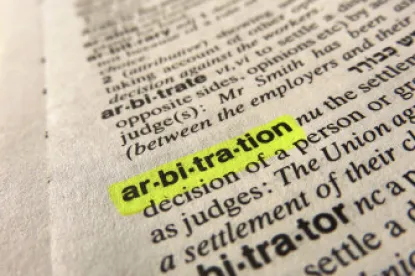As we all know, using arbitration clauses in commercial agreements is pretty commonplace – particularly in the franchise world. Yet, as two recent federal appeals court decisions make clear, attention needs to be paid to the arbitration clause to protect the parties’ choice of dispute resolution. Neither decision involved franchising arrangements, yet the implication of those cases could surely affect arbitration clauses in franchise agreements.
In Tillman v. Tillman, 825 F.3d 1069 (9th Cir. 2016), the Ninth Circuit permitted litigation to proceed despite the parties’ agreement to resolve disputes by AAA arbitration. Specifically, Tillman involved a legal malpractice claim brought in court by a client against her former attorneys. The litigation was stayed on motion of the law firm pending the mandated arbitration. Following preliminary arbitration hearings between the parties, the client could not pay a necessary deposit required to maintain the arbitration proceedings. The law firm was offered the opportunity to pay the client’s share of costs but refused and requested that the arbitration be terminated. The arbitrator terminated the proceedings. The U.S. District Court held that it did not have authority to hear the matter under the Federal Arbitration Act (“FAA”) as the claims were subject to arbitration pursuant to the parties’ engagement letter. However, the Ninth Circuit reversed and held that, since the engagement letter did not expressly require that arbitration result in a dismissal or an award, arbitration had been “had in accordance with the term of the Agreement.” §3 FAA. The proceed and the FAA’s strong public policy in favor of arbitration was not violated. In reaching this conclusion, the Tillman court relied on a recent Tenth Circuit decision – Pre-Paid Legal Services, Inc. v. Cahill, 786 F.3d 1287 (10th Cir. 2015) – which also permitted litigation to proceed based on a party’s inability to pay his share of the arbitration fees and costs.
In both Tillman and Pre-Paid, the parties’ intentions to resolve disputes through arbitration should have been honored. The following practice pointers may help avoid similar results. First, a franchisor placed in this position could pay the franchisee’s costs and fees with the hope of recoupment if successful on the merits. Second, you should consider carefully drafting arbitration clauses to preclude such a result.
Specifically, you should draft an arbitration clause so that it makes clear that the parties intend to forego the right to litigate claims, even where arbitration does not result in a decision on the merits – e.g., where an arbitration is terminated prematurely based on one party’s failure to comply with the AAA’s rules (such as non-payment).As we all know, using arbitration clauses in commercial agreements is pretty commonplace – particularly in the franchise world.
In the context of a franchise relationship that has gone sour, it is clearly within the realm of possibility that a disgruntled franchisee may be unable or willing to pay arbitration costs. However, parties often do not contemplate a “two cracks at the apple” situation, such as those at issue in Tillman and Pre-Paid. Juxtaposed, if franchisors chose arbitration hoping that the costs and fees would be too burdensome for their franchisees to afford, Tillman illustrates that the Ninth Circuit is willing to create a safe harbor to allow parties in dispute to fully resolve their issues, rather than be defaulted.




 />i
/>i

